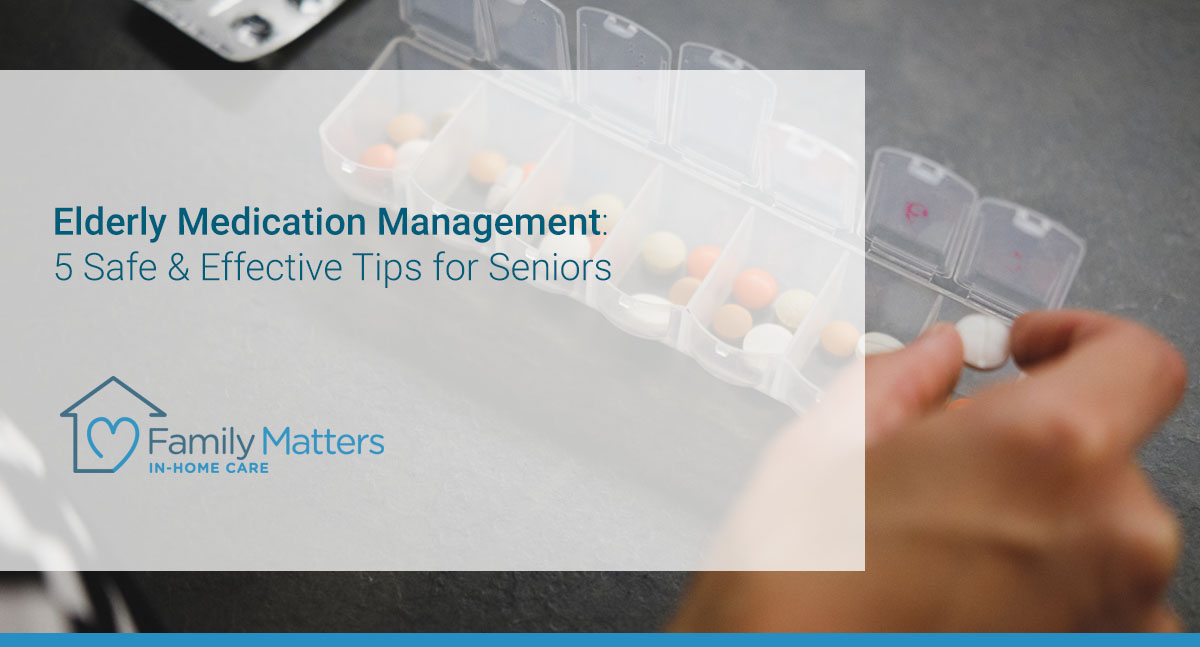
Elderly Medication Management: 5 Safe & Effective Tips for Seniors
Whether you’re an adult taking care of your aging parents or a professional caregiver, elderly medication management can be challenging. Typically, seniors have multiple medications they must take throughout the day. These medications vary in purpose and generally need to be taken at specific times and doses.
This can make it easy to confuse medications or skip them altogether if you don’t take organizational steps to ensure everything’s covered. Elderly medication management is important both for managing problematic symptoms of certain conditions and keeping seniors healthy over the long term.
Fortunately, you can take some simple steps to make elderly medication management easier. The following five safe and effective tips will make managing medication more streamlined for seniors and their caregivers alike.
1. Take Time to Make a List of All Daily Medications
The most important step in successful elderly medication management is to make sure you know exactly what you need to do each day. This means taking some important time to create an updated list of prescription medications that anyone helping a senior in a living community or their home can reference whenever necessary.
In addition to prescription medications, this list should include any vitamins, over-the-counter medications, and supplements the senior is taking daily, as well. The comprehensive medication list should clearly state the name of the medication and how often it’s taken along with the prescribed dose.
Make sure to indicate whether a medication is intended for long-term use or is simply a short-term solution. Writing out the purpose of each drug and the prescribing physician is extremely helpful when questions arise.
2. Pre-Sort to Make Elderly Medication Management Simple
Once you know what medication your elderly parent or patient needs daily, pre-sorting those medications for the week is a good way to streamline elderly medication management.
Pre-sorting gives caretakers peace of mind knowing that no medication has been missed. For seniors living independently, pre-sorting can take the stress out of trying to manage daily dosages.
A pill organizer is incredibly useful when pre-sorting a week’s worth of medication. Each compartment has a designated “day” of medication. If some medicines need to be cut in half to be most effective, you can take care of that ahead of time, as well.
3. Create a Customized Tracking System
Whether you’re the sole caregiver for aging parents or you’re working with a team of professional caregivers in a senior’s home, having a customized tracking system in place for medications is essential. It’s very helpful for reminders that can get lost in the shuffle among all the many daily details to consider.
Customized tracking systems are helpful for seniors that like to be able to check that they’ve taken a medication off the list. They’re also great for giving in-coming caregivers insight into what’s been taken and what’s left for the day.
There are many ways to approach a tracking system. Some households find that a simple pen and paper is the best route to logging daily medications. Those households who are a bit more tech-savvy might find a shared phone app to be more efficient.
Setting daily alarms is also a good idea to remind seniors to take important medication at certain times. You can set these alarms on phones or clocks.
4. Consider the Possibility of Detrimental Medication Interactions
Of course, you should understand what medications your parent or patient is taking and when. That said, it’s perhaps even more vital to keep track of any possible drug interactions that could be detrimental or dangerous.
Taking time to review possible side effects of mixing different prescriptions, over-the-counter medications, or supplements is essential. Not taking time to do this could create inadvertent health issues and make emergencies more difficult to manage.
If you don’t know anything about the medications you’re administering, reach out to doctors or pharmacists for information regarding any potential drug interactions. There are also online drug interaction checkers that can be accessed from a mobile device when it’s more convenient.
5. Keep an Eye on Those Refill Timelines
Helping seniors maintain their health standards often includes the help of several long-term prescription medications. Unexpectedly running out of these medications can cause stress and health issues too.
To that end, it’s essential to make sure refills are available on time. This will help you prevent missed doses and confusion. If it’s possible to have your parent’s or patient’s physician fill a prescription for 90 days, the process will be that much easier. Many pharmacies also offer an auto-refill option with reminders so seniors know exactly when medication needs to be picked up.
Don’t hesitate to ask pharmacists if they offer prescription delivery services. That strategy will make refills and accessing medication nearly completely automated without needing to track much at all.
If you or your family member is considering in-home care as part of a plan to age in place, contact Family Matters In-Home Care today for a free consultation. Our team is dedicated to supporting your family and helping older adults enjoy life in the comfort of their own home for as long as possible.
Some of the services offered by Family Matter In-Home Care include: Alzheimer’s & Dementia Care, Bed & Wheelchair Transfer Assistance, Companionship, Housekeeping & Meal Preparation, Personal Care, Recovery Care, and Transportation.
Serving the San Francisco Bay Area and Greater San Diego, Family Matter In-Home Care has offices throughout California including: Campbell, CA, Roseville, CA, San Marcos, CA, and San Mateo, CA.
